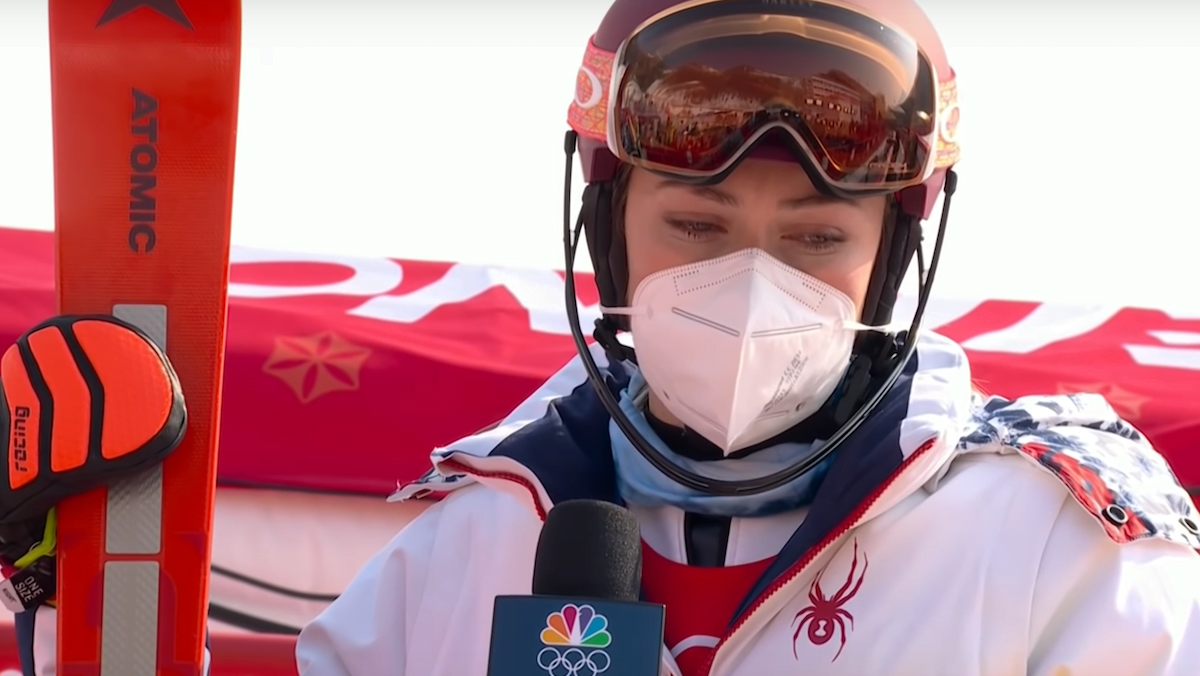Defeat can be as compelling as victory in athletic competition. That seems especially true in Olympic sports, many of which are individual events, narrowing the focus on the competitor and sometimes creating intense pressure to succeed.
In many cases, these athletes are also young and began training at such an early age that they sacrifice learning basic life skills so that they can hone their skills and become Olympians. Yes, if they win, fame and glory often follow. But if they don’t, failing to meet expectations can lead to humiliation, pain, and depression.
One of the biggest storylines during the 2022 Winter Olympics has been skier Mikaela Shiffrin and her failure (that word seems problematic here) during the giant slalom and women’s slalom competitions in which she was expected to win gold medals. In both events, Shiffrin wasn’t able to maintain her balance, skidded out, and was disqualified (or DNF, “Did Not Finish”).
But more than empathizing with Shiffrin as she dealt with her deep disappointment, many viewers were concerned about the skier being closely scrutinized by NBC cameras and reporters when she was at her most crestfallen and vulnerable. Directors lingered on Shiffrin sitting alone in sorrow, attempting to process what happened. Reporter Todd Lewis interviewed her shortly afterward, as she fought back tears to answer questions. (Shiffrin went on to face 45 more minutes of questions from media afterward.)
To be fair, NBC directors and producers, and Lewis as a reporter, were all doing their jobs. (Many also criticized cameras lingering on Shiffrin as the event continued and focusing too much on the U.S. competitor in the event. Yet NBC has faced those objections for years throughout their coverage of many Olympic games.) If Shiffrin was the centerpiece of women’s slalom coverage, staying with her was the objective.
But maybe it’s the job that needs to change. Maybe such close coverage can back off a bit. A key part of Olympics coverage is highlighting the athletes to follow, the hopefuls with the best chance of bringing a gold medal home to the United States. Perhaps it’s time to point viewers in a certain direction without locking their gaze and forcing them to ask, “Well? We’re waiting” like Judge Smails in Caddyshack.
In defending NBC’s coverage of Shiffrin, executive producer Molly Solomon told the Associated Press that they have an obligation to document “real people with real emotions in real time.” She said they would do the same thing if Joe Burrow or Matthew Stafford sat on the sidelines after losing the Super Bowl, dwelling on their defeat. And no one would likely object to that, so why should the standard be different for female athletes?
“Here we are in 2022 and we have a double standard in coverage of women’s sports,” said Solomon. “Women’s sports should be analyzed through the same lens as the men. The most famous skier in the world did not finish her two best events. So we are going to show her sitting on the hill and analyze what went wrong. You bet we are.”
Solomon goes on to point out that Shiffrin is a 26-year-old professional athlete. Hey, Simone Biles was 24 when she withdrew from several gymnastics events due to struggles with mental health and anxiety during last year’s Summer Olympics. Are they supposed to just put on sunglasses and deal with it because they’re older?
The fallacy in that comparison is that Shiffrin and fellow Olympic athletes (like Simone Biles, 24, who struggled with mental health and anxiety during last year’s Summer Olympics) don’t have the support system, the resources to deal with defeat and address mental health that an NFL player would.
Athletes have been increasingly outspoken about the toll that training and competition without proper emotional and therapeutic support has taken on their mental health. The culture in general is more aware of mental wellness and finding balance in life.
When Desus & Mero ask Keanu Reeves and Carrie-Anne Moss what they do for their mental health during an interview to promote The Matrix Resurrections, this is a topic that has broken through into mainstream discussion and pop culture.
HBO devoted an entire documentary, 2020’s The Weight of Gold, to how poorly Olympic athletes are supported mentally and emotionally. As Gracie Gold says in the film, doctors can treat a knee problem. But what if an athlete is having dark thoughts and needs to talk to someone besides a fellow competitor who isn’t equipped for those conversations?
The message from nearly a dozen Olympians — including well-known names like Michael Phelps, Bode Miller, Sasha Cohen, Apolo Ohno, Lolo Jones, Shaun White, and Jeremy Bloom — is that training at such a young age meant that they didn’t get to do the things so many of us associate with childhood, like playing with friends, learning to ride bicycles, or watching cartoons. Those are what make us who we are, what help us learn to live in the world.
Keeping a camera on them at their worst moment reinforces the idea that these people are only defined by their success or failure, by whether or not they won honor and glory for their country.
Yes, NBC Sports producers, directors, reporters, and crew are documentarians. They’re also storytellers, which means following athletes on their journeys to victory or defeat, and sometimes the painful aftermath.
But the story has changed. If NBC and other TV networks want to tell that complete narrative, they need to exercise some responsibility and chronicle the consequences as well. If you leave that to the athletes, they’ll stop talking to the media, as Shiffrin has. How can stories be told under those circumstances?
Ian Casselberry is a sports media columnist for BSM. He has previously written and edited for Awful Announcing, The Comeback, Sports Illustrated, Yahoo Sports, MLive, Bleacher Report, and SB Nation. You can find him on Twitter @iancass or reach him by email at iancass@gmail.com.







